Abstract
OBJECTIVE: The human genes MAGE-1 and -3 encode tumor-specific peptide antigens, which are recognized by autologous cytotoxic T lymphocytes. The antigens coded by those genes may be useful for cancer immunotherapy. There is, however, little information on the expression of these genes in human colorectal carcinomas. METHOD: The expression of MAGE-1, -2, and -3 genes in 54 pairs of tumor and corresponding normal tissue specimens of the colorectum was determined by means of reverse transcription polymerase chain reaction. The induction of MAGE-1, -2, -3, and -4 gene expression in eight colorectal carcinoma cell lines also was examined by use of a demethylating agent, 5-Aza-2'-deoxycytidine (DAC). RESULTS: The expression of MAGE genes was not recognized in normal colorectal tissues at all. In tumor tissue specimens, the expression of MAGE-1, -2, and -3 was recognized in 16 (30%), 15 (28%), and 11 (20%) patients, respectively. The expression was seen frequently in patients with liver metastasis (p < 0.01). Although MAGE-1 or -3 genes were not induced by DAC, MAGE-2 or -4 genes were induced in three of four MAGE-2 negative cell lines or three of seven MAGE-4 negative cell lines, respectively. CONCLUSIONS: The MAGE genes were expressed exclusively in tumor tissues of one third of patients with colorectal carcinoma. The identification of such tumor rejection antigens is considered to uncover a new possibility for the specific immunotherapy of colorectal carcinoma. The demethylating agent may increase the number of patients who might be candidates for MAGE-specific immunotherapy.
Full text
PDF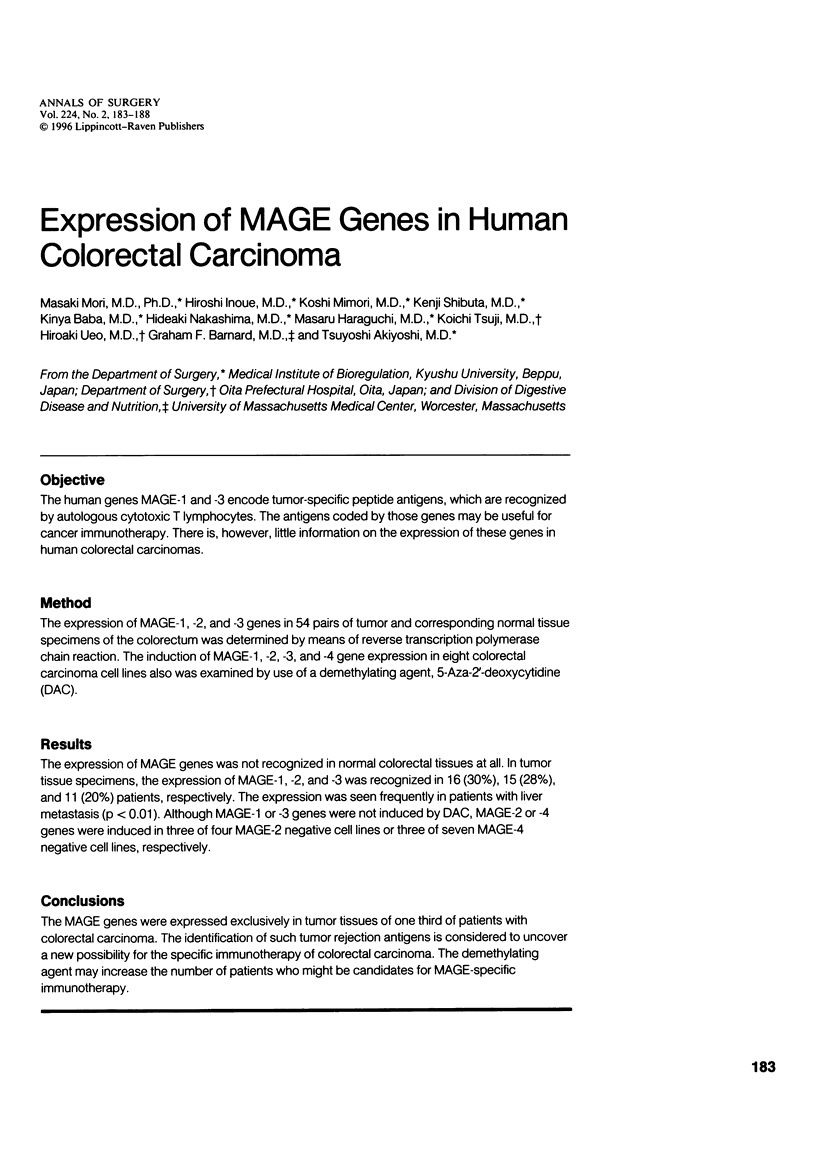
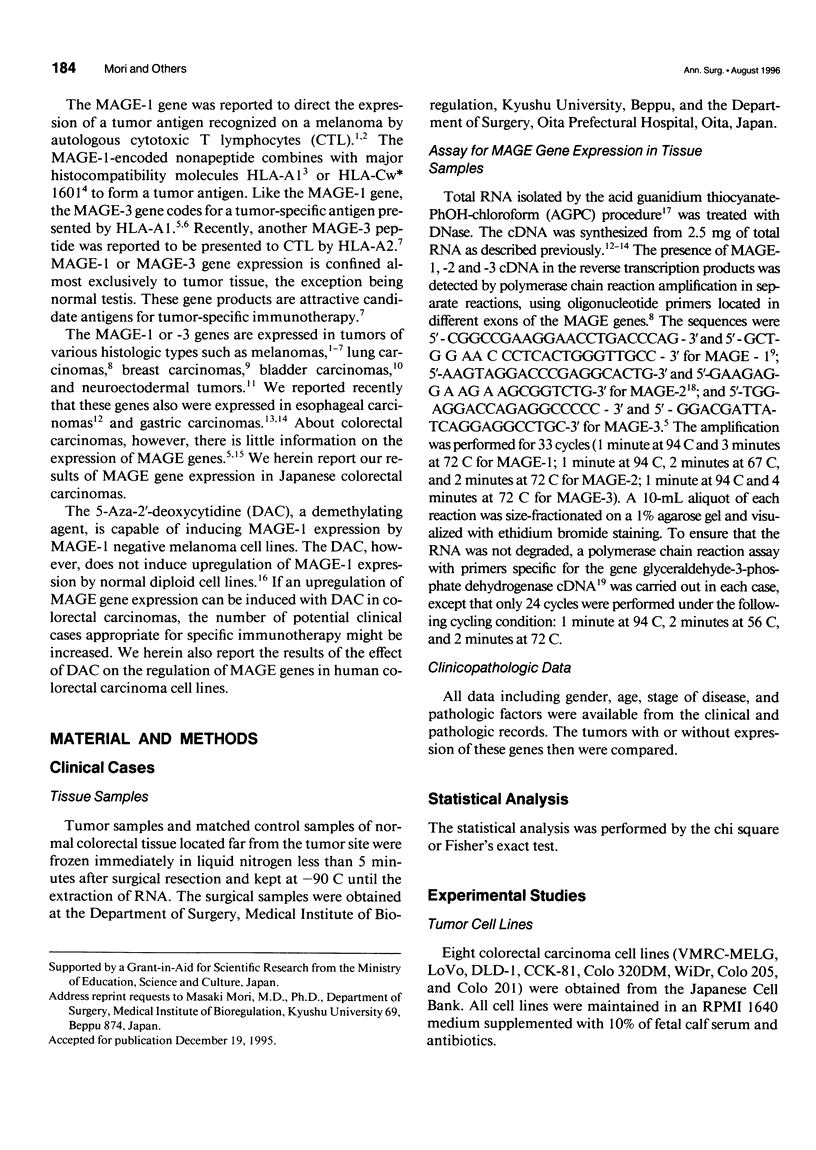
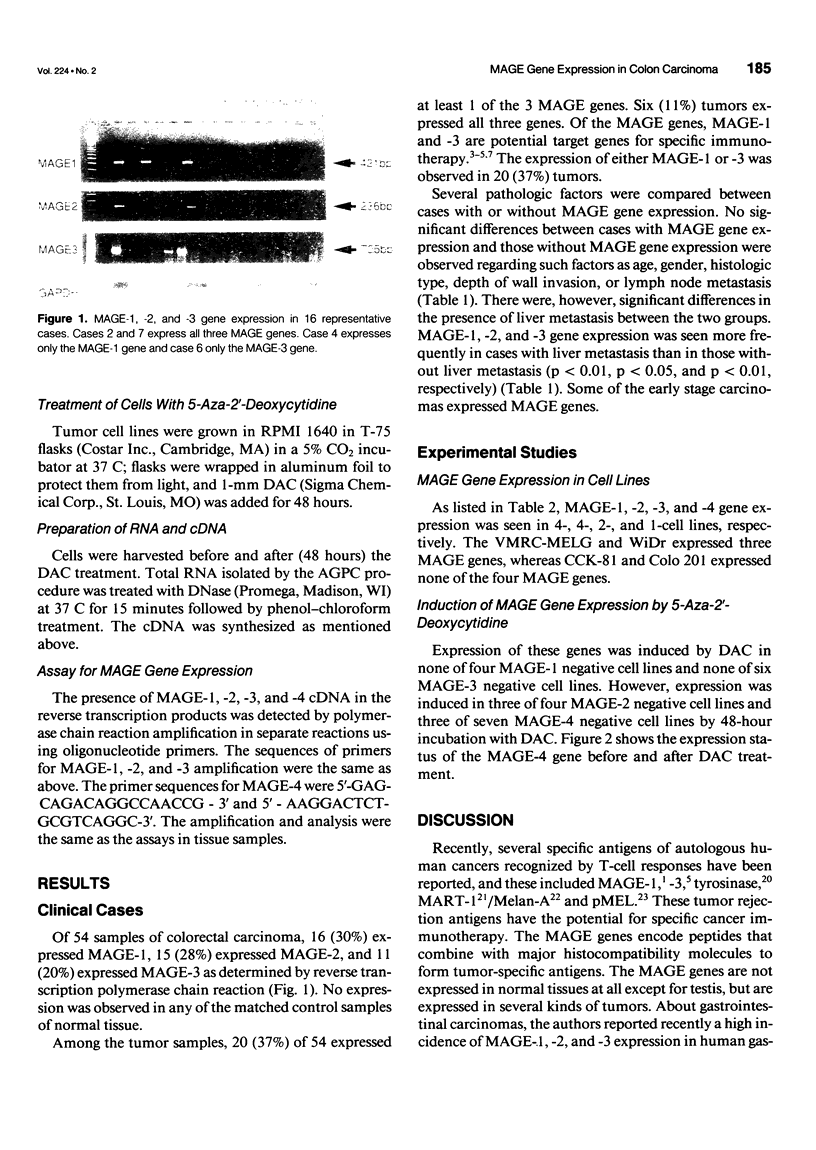
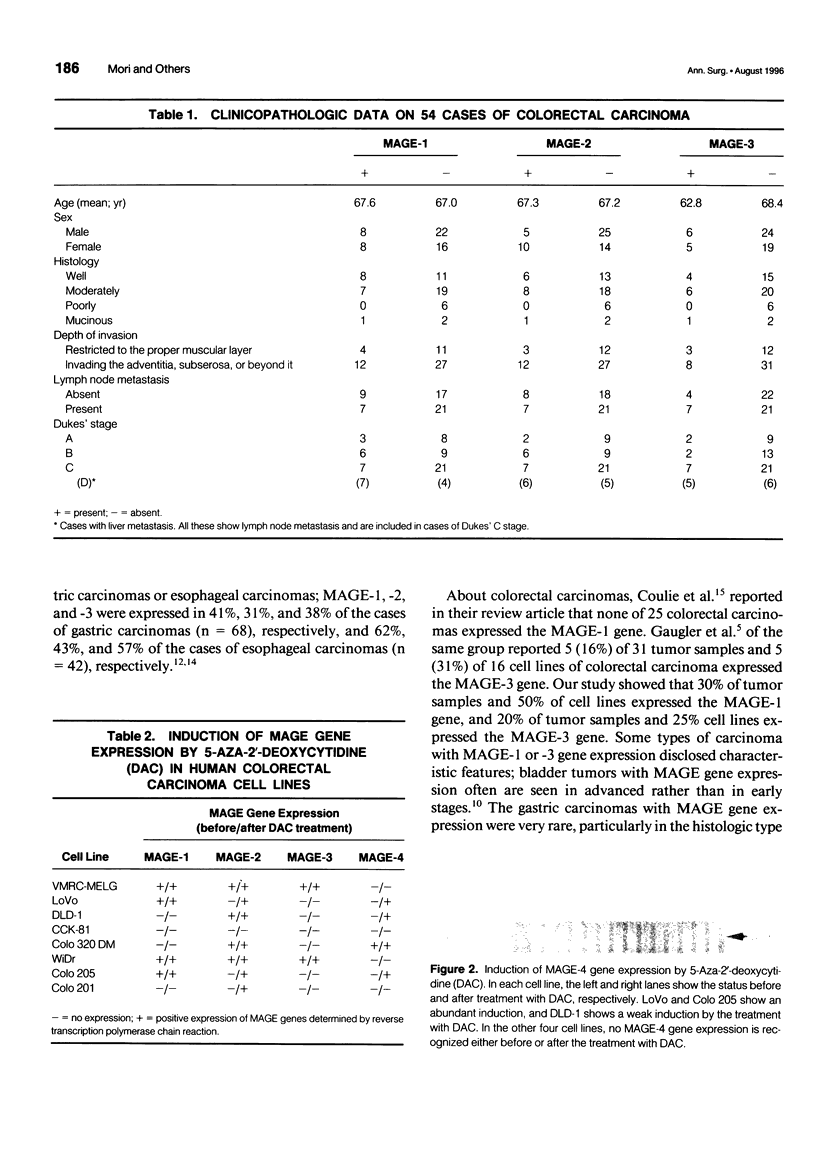
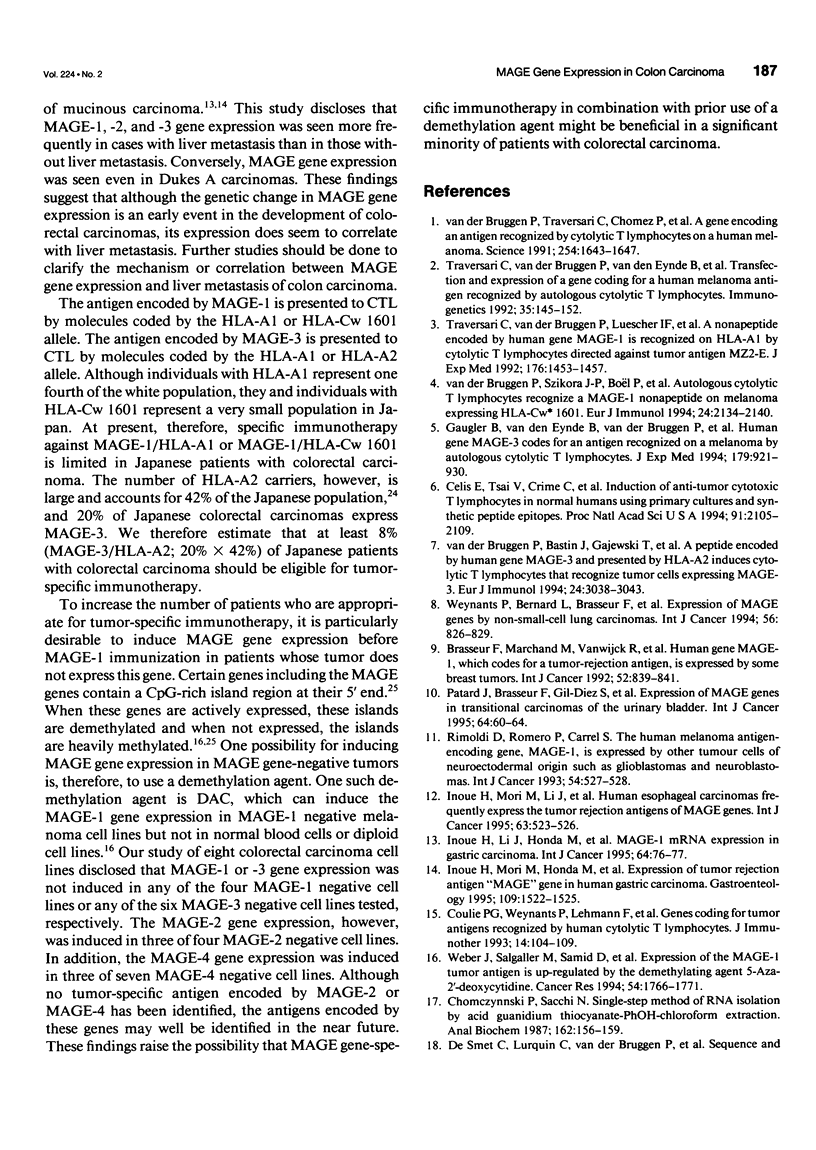
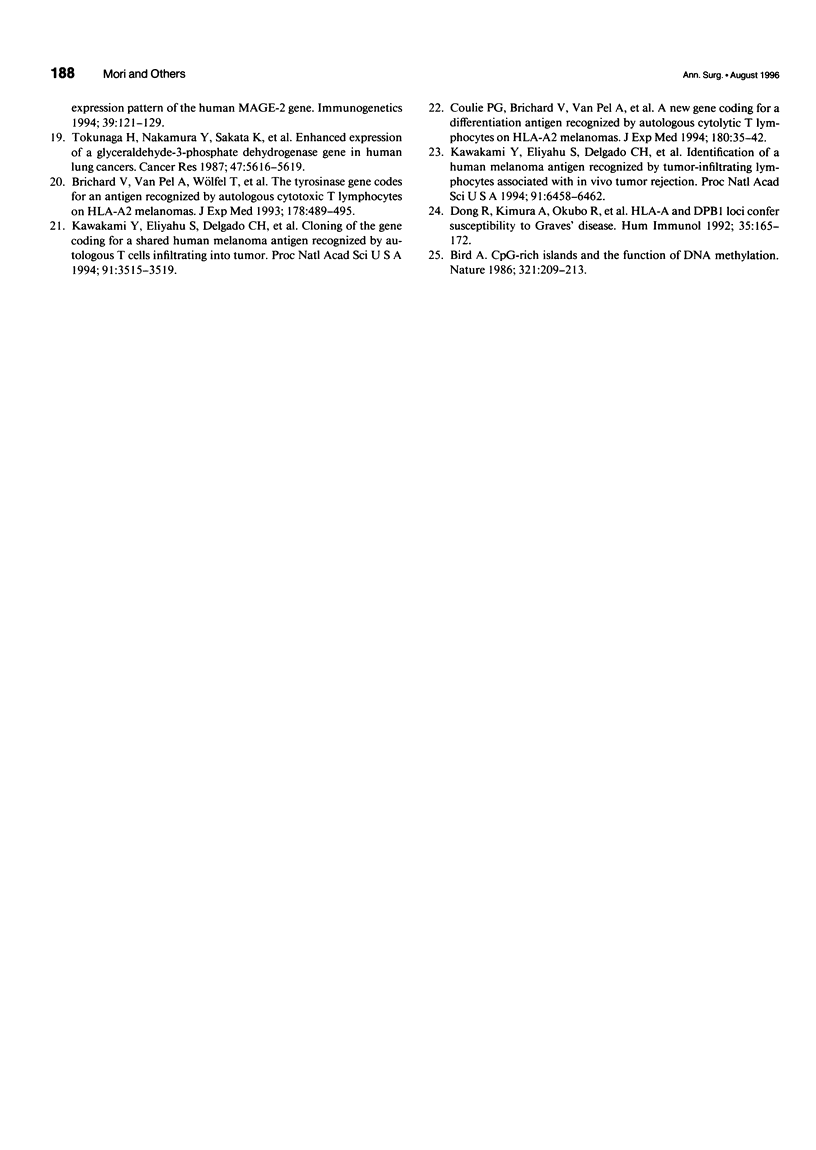
Images in this article
Selected References
These references are in PubMed. This may not be the complete list of references from this article.
- Bird A. P. CpG-rich islands and the function of DNA methylation. Nature. 1986 May 15;321(6067):209–213. doi: 10.1038/321209a0. [DOI] [PubMed] [Google Scholar]
- Brasseur F., Marchand M., Vanwijck R., Hérin M., Lethé B., Chomez P., Boon T. Human gene MAGE-1, which codes for a tumor-rejection antigen, is expressed by some breast tumors. Int J Cancer. 1992 Nov 11;52(5):839–841. doi: 10.1002/ijc.2910520528. [DOI] [PubMed] [Google Scholar]
- Brichard V., Van Pel A., Wölfel T., Wölfel C., De Plaen E., Lethé B., Coulie P., Boon T. The tyrosinase gene codes for an antigen recognized by autologous cytolytic T lymphocytes on HLA-A2 melanomas. J Exp Med. 1993 Aug 1;178(2):489–495. doi: 10.1084/jem.178.2.489. [DOI] [PMC free article] [PubMed] [Google Scholar]
- Celis E., Tsai V., Crimi C., DeMars R., Wentworth P. A., Chesnut R. W., Grey H. M., Sette A., Serra H. M. Induction of anti-tumor cytotoxic T lymphocytes in normal humans using primary cultures and synthetic peptide epitopes. Proc Natl Acad Sci U S A. 1994 Mar 15;91(6):2105–2109. doi: 10.1073/pnas.91.6.2105. [DOI] [PMC free article] [PubMed] [Google Scholar]
- Chomczynski P., Sacchi N. Single-step method of RNA isolation by acid guanidinium thiocyanate-phenol-chloroform extraction. Anal Biochem. 1987 Apr;162(1):156–159. doi: 10.1006/abio.1987.9999. [DOI] [PubMed] [Google Scholar]
- Coulie P. G., Brichard V., Van Pel A., Wölfel T., Schneider J., Traversari C., Mattei S., De Plaen E., Lurquin C., Szikora J. P. A new gene coding for a differentiation antigen recognized by autologous cytolytic T lymphocytes on HLA-A2 melanomas. J Exp Med. 1994 Jul 1;180(1):35–42. doi: 10.1084/jem.180.1.35. [DOI] [PMC free article] [PubMed] [Google Scholar]
- Coulie P. G., Weynants P., Lehmann F., Herman J., Brichard V., Wölfel T., Van Pel A., De Plaen E., Brasseur F., Boon T. Genes coding for tumor antigens recognized by human cytolytic T lymphocytes. J Immunother Emphasis Tumor Immunol. 1993 Aug;14(2):104–109. doi: 10.1097/00002371-199308000-00004. [DOI] [PubMed] [Google Scholar]
- De Smet C., Lurquin C., van der Bruggen P., De Plaen E., Brasseur F., Boon T. Sequence and expression pattern of the human MAGE2 gene. Immunogenetics. 1994;39(2):121–129. doi: 10.1007/BF00188615. [DOI] [PubMed] [Google Scholar]
- Dong R. P., Kimura A., Okubo R., Shinagawa H., Tamai H., Nishimura Y., Sasazuki T. HLA-A and DPB1 loci confer susceptibility to Graves' disease. Hum Immunol. 1992 Nov;35(3):165–172. doi: 10.1016/0198-8859(92)90101-r. [DOI] [PubMed] [Google Scholar]
- Gaugler B., Van den Eynde B., van der Bruggen P., Romero P., Gaforio J. J., De Plaen E., Lethé B., Brasseur F., Boon T. Human gene MAGE-3 codes for an antigen recognized on a melanoma by autologous cytolytic T lymphocytes. J Exp Med. 1994 Mar 1;179(3):921–930. doi: 10.1084/jem.179.3.921. [DOI] [PMC free article] [PubMed] [Google Scholar]
- Inoue H., Li J., Honda M., Nakashima H., Shibuta K., Arinaga S., Ueo H., Mori M., Akiyoshi T. MAGE-1 mRNA expression in gastric carcinoma. Int J Cancer. 1995 Feb 20;64(1):76–77. doi: 10.1002/ijc.2910640115. [DOI] [PubMed] [Google Scholar]
- Inoue H., Mori M., Honda M., Li J., Shibuta K., Mimori K., Ueo H., Akiyoshi T. The expression of tumor-rejection antigen "MAGE" genes in human gastric carcinoma. Gastroenterology. 1995 Nov;109(5):1522–1525. doi: 10.1016/0016-5085(95)90639-8. [DOI] [PubMed] [Google Scholar]
- Inoue H., Mori M., Li J., Mimori K., Honda M., Nakashima H., Mafune K., Tanaka Y., Akiyoshi T. Human esophageal carcinomas frequently express the tumor-rejection antigens of MAGE genes. Int J Cancer. 1995 Nov 15;63(4):523–526. doi: 10.1002/ijc.2910630411. [DOI] [PubMed] [Google Scholar]
- Kawakami Y., Eliyahu S., Delgado C. H., Robbins P. F., Rivoltini L., Topalian S. L., Miki T., Rosenberg S. A. Cloning of the gene coding for a shared human melanoma antigen recognized by autologous T cells infiltrating into tumor. Proc Natl Acad Sci U S A. 1994 Apr 26;91(9):3515–3519. doi: 10.1073/pnas.91.9.3515. [DOI] [PMC free article] [PubMed] [Google Scholar]
- Kawakami Y., Eliyahu S., Delgado C. H., Robbins P. F., Sakaguchi K., Appella E., Yannelli J. R., Adema G. J., Miki T., Rosenberg S. A. Identification of a human melanoma antigen recognized by tumor-infiltrating lymphocytes associated with in vivo tumor rejection. Proc Natl Acad Sci U S A. 1994 Jul 5;91(14):6458–6462. doi: 10.1073/pnas.91.14.6458. [DOI] [PMC free article] [PubMed] [Google Scholar]
- Patard J. J., Brasseur F., Gil-Diez S., Radvanyi F., Marchand M., François P., Abi-Aad A., Van Cangh P., Abbou C. C., Chopin D. Expression of MAGE genes in transitional-cell carcinomas of the urinary bladder. Int J Cancer. 1995 Feb 20;64(1):60–64. doi: 10.1002/ijc.2910640112. [DOI] [PubMed] [Google Scholar]
- Rimoldi D., Romero P., Carrel S. The human melanoma antigen-encoding gene, MAGE-1, is expressed by other tumour cells of neuroectodermal origin such as glioblastomas and neuroblastomas. Int J Cancer. 1993 May 28;54(3):527–528. doi: 10.1002/ijc.2910540329. [DOI] [PubMed] [Google Scholar]
- Tokunaga K., Nakamura Y., Sakata K., Fujimori K., Ohkubo M., Sawada K., Sakiyama S. Enhanced expression of a glyceraldehyde-3-phosphate dehydrogenase gene in human lung cancers. Cancer Res. 1987 Nov 1;47(21):5616–5619. [PubMed] [Google Scholar]
- Traversari C., van der Bruggen P., Luescher I. F., Lurquin C., Chomez P., Van Pel A., De Plaen E., Amar-Costesec A., Boon T. A nonapeptide encoded by human gene MAGE-1 is recognized on HLA-A1 by cytolytic T lymphocytes directed against tumor antigen MZ2-E. J Exp Med. 1992 Nov 1;176(5):1453–1457. doi: 10.1084/jem.176.5.1453. [DOI] [PMC free article] [PubMed] [Google Scholar]
- Traversari C., van der Bruggen P., Van den Eynde B., Hainaut P., Lemoine C., Ohta N., Old L., Boon T. Transfection and expression of a gene coding for a human melanoma antigen recognized by autologous cytolytic T lymphocytes. Immunogenetics. 1992;35(3):145–152. doi: 10.1007/BF00185107. [DOI] [PubMed] [Google Scholar]
- Weber J., Salgaller M., Samid D., Johnson B., Herlyn M., Lassam N., Treisman J., Rosenberg S. A. Expression of the MAGE-1 tumor antigen is up-regulated by the demethylating agent 5-aza-2'-deoxycytidine. Cancer Res. 1994 Apr 1;54(7):1766–1771. [PubMed] [Google Scholar]
- Weynants P., Lethé B., Brasseur F., Marchand M., Boon T. Expression of mage genes by non-small-cell lung carcinomas. Int J Cancer. 1994 Mar 15;56(6):826–829. doi: 10.1002/ijc.2910560612. [DOI] [PubMed] [Google Scholar]
- van der Bruggen P., Bastin J., Gajewski T., Coulie P. G., Boël P., De Smet C., Traversari C., Townsend A., Boon T. A peptide encoded by human gene MAGE-3 and presented by HLA-A2 induces cytolytic T lymphocytes that recognize tumor cells expressing MAGE-3. Eur J Immunol. 1994 Dec;24(12):3038–3043. doi: 10.1002/eji.1830241218. [DOI] [PubMed] [Google Scholar]
- van der Bruggen P., Szikora J. P., Boël P., Wildmann C., Somville M., Sensi M., Boon T. Autologous cytolytic T lymphocytes recognize a MAGE-1 nonapeptide on melanomas expressing HLA-Cw*1601. Eur J Immunol. 1994 Sep;24(9):2134–2140. doi: 10.1002/eji.1830240930. [DOI] [PubMed] [Google Scholar]
- van der Bruggen P., Traversari C., Chomez P., Lurquin C., De Plaen E., Van den Eynde B., Knuth A., Boon T. A gene encoding an antigen recognized by cytolytic T lymphocytes on a human melanoma. Science. 1991 Dec 13;254(5038):1643–1647. doi: 10.1126/science.1840703. [DOI] [PubMed] [Google Scholar]




